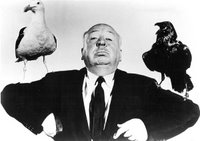 I find this very interesting. I have a songbird that has been coming around the past few springs that "tweets" out the tune to "Old MacDonald Had a Farm." I haven't "seen" it yet, but have recorded its song on audiotape. I am interested if any of my readers have ever heard of such a bird with this type of song, or is it just a magpie or some other kind of mimicking bird that has picked up this tune from humans somehow.
I find this very interesting. I have a songbird that has been coming around the past few springs that "tweets" out the tune to "Old MacDonald Had a Farm." I haven't "seen" it yet, but have recorded its song on audiotape. I am interested if any of my readers have ever heard of such a bird with this type of song, or is it just a magpie or some other kind of mimicking bird that has picked up this tune from humans somehow.LONDON (Reuters) - European starlings are not just exceptional songbirds and mimics they also recognize a grammar in their songs in a way that was thought to be unique to humans.
Scientists in the United States have discovered that the birds can be taught to identify different patterns of organizing sounds used to communicate.
"We show that European starlings accurately recognize acoustic patterns defined by a recursive, self-embedding, context-free grammar," said Timothy Gentner of the University of California San Diego (UCSD), in the journal Nature.
Recursive grammar, in which words and clauses are inserted into sentences to create new meaning, is found in all human languages. It was considered a type of linguistic boundary that separated humans from other creatures.
"Now we find that we have been joined on this side of the boundary by the starling. It should no longer be considered an insult to be called a bird-brain," said Daniel Margoliash of the University of Chicago, a co-author of the study.
While humans change a sentence from "the bird sang" to "the bird the cat chased sang" by inserting words, starlings combine chirps, warbles, trills, whistles and rattling sounds.
The scientists discovered their ability by recording eight different starling sounds and combining them to make 16 artificial songs, some more complex than others, which had different grammars or patterning rules.
After teaching the birds to recognize the different sets of songs, nine out of 11 birds could distinguish the patterns and grammatical rules.
"These birds are a lot smarter than you might think," said Margoliash. "They have innate abilities. They solve interesting problems and learn difficult tasks."







3 comments:
Stardust:
This sentence really kinda tossed me:
"We show that European starlings accurately recognize acoustic patterns defined by a recursive, self-embedding, context-free grammar,"
How very weird.
Starlings are regarded as the carriers of souls. The starling is also known (the males) to imitate human song.
ra - maybe that is a starling in our neighborhood that sings the "old macdonald" tune? We have a lot of starlings around here and they seem to "bully" the other birds. We had to take our gas grill off the deck and put it in the garage because the starlings were building a nest in it all the time. We would plug holes, and put up wire mesh and all sorts of things and they would find their way in and so we had to "retreat" the grill to indoors. I know that has nothing to do with birdsongs and grammar, but these birds are pretty damned smart!
stardust:
I know that has nothing to do with birdsongs and grammar, but these birds are pretty damned smart!
Which probably lent itself to the superstition. I think it was unbaptized souls.
Perpignan, a city in France, is annually flooded w/starlings.
Post a Comment